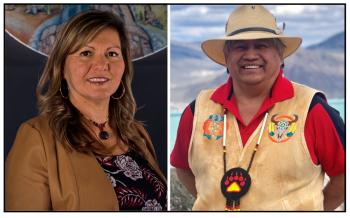Image Caption
Summary
Local Journalism Initiative Reporter
Windspeaker.com
Assembly of First Nations chiefs have passed emergency resolutions calling for international action to be taken against Canada and the Roman Catholic Church for the genocide perpetrated against Indigenous peoples through the residential school system.
They also called for an end to church arson being committed by some in retribution for children’s deaths after many hundreds of remains were located in unmarked graves at former residential schools in recent months, with more expected to be uncovered across the country.
“It’s disheartening to see in the news churches being burnt and monuments being overturned. That’s not the way,” said Chief Marcel Head of Shoal Lake Cree Nation.
“I’ve heard chiefs call and voice their concern about this. And also the fact that, to the Elders, they have not taught to be bitter or angry towards the past mistreatment of our people.”
Head made his comments on July 6, the first day of the three-day annual general assembly for the AFN, as chiefs were discussing two emergency resolutions brought forward by Kukpi7 Rosanne Casimir of Tk’emlúps te Secwépemc. It was there that the first children’s remains—215 it is estimated—were located on the grounds of the former Kamloops residential school.
Less than a month later, Cowessess First Nation in Saskatchewan announced that 751 unmarked graves had been found on the grounds of former Marieval residential school. Both schools were operated by the Catholic Church.
Since that time, at least seven Catholic churches have been burned, the majority on First Nations land, and numerous others vandalized.
“It’s something very troubling when you’re starting to find unmarked graves. But I don’t think we have to get mad over it. I know there are ways to deal with anger and bitterness,” said Head, who urged those who felt this way to get help.
“This is a time now for our First Nations right across the country and the world to really be the catalyst for change … Once we leave this world, our children, our grandchildren, our great grandchildren will continue to live their lives based on the foundation and legacy we leave behind,” said Federation of Sovereign Indigenous Nations Chief Bobby Cameron.
The first emergency resolution, “Demanding Justice and Accountability for the Missing and Unidentified Children of Residential Schools”, in part, gave Canada and the Roman Catholic Church six months to take action, in partnership with First Nations.
It is demanding they turn over records to identify the unmarked graves; provide adequate funding for any work that is undertaken to recover remains; and to identify and appoint a Special Rapporteur to establish a guardianship structure respecting the laws of each impacted First Nation.
The timeframe was set taking into account the Indigenous delegation that will be going to the Vatican to speak with the Pope in December to seek an apology.
Chief Byron Louie of the Okanagan Indian Band called that upcoming visit to the Vatican “galling” and questioned the value of an apology from the Pope that came from “begging.”
He pointed out that the Vatican was a state and not a church.
“If anything, I would rather see us expending our effort to take them to the International Criminal Court and lobby for them to be basically held accountable as a state for hiding evidence to this day about all these burials that are being identified,” said Louie.
The second emergency resolution, “Preliminary Examination of the Prosecutor of the International Criminal Court”, directs the AFN, among other actions, to “seek justice through intervention at the International Criminal Court in this matter, to hold the Imperial Crown, Government of Canada and the Vatican accountable for their actions and to seek justice for the crimes against humanity for the victims’ families and the international community.”
Chiefs agreed that the unmarked gravesites were potential crime scenes and also agreed to formally invite the International Commission on Missing Persons to work with First Nations to support the work as part of an international entity.
“This is the mandate of the AFN, to move into this whole realm of international processes to get our story out there in such a way that the world will never forget what happened. It’s important. We need to move beyond reconciliation. We have to think about redress, restitution and reconstruction,” said Kukpi7 Wayne Christian of Splatsin First Nation.
“The International Criminal Court is a part of that puzzle. We need to get out there and start advocating at an international level for these crimes against humanity,” Christian continued.
“For whoever the national chief may be, you need to pick this up and do something for our children and for our future,” he said.
Voting for the new national chief takes place today and selection will be completed if two ballots or less are required. If more than two ballots are needed, the election will go into Thursday. There are seven candidates seeking to replace outgoing National Chief Perry Bellegarde: RoseAnne Archibald, Reginald Bellerose, Jodi Calahoo-Stonehouse, Lee Crowchild, Alvin Fiddler, Kevin Hart and Cathy Martin.
Both resolutions passed with almost full support from chiefs.
Local Journalism Initiative Reporters are supported by a financial contribution made by the Government of Canada.

